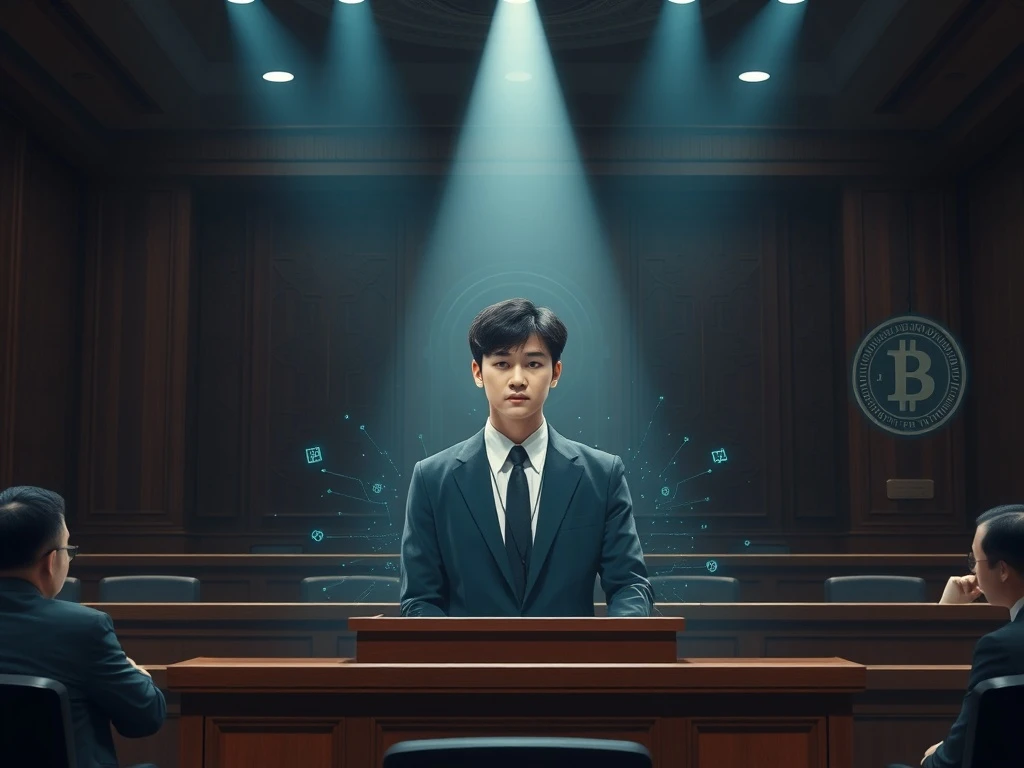Pica Coin Scandal: Park Gyuri Fights Explosive Crypto Fraud Allegations in Court

The intersection of celebrity influence and the volatile world of cryptocurrency often creates a fascinating, yet sometimes perilous, landscape. Currently captivating headlines, the ongoing legal battle involving former K-pop sensation Park Gyuri and the controversial Pica Coin project is a stark reminder of these inherent risks. Are you curious about how a celebrity’s reputation can become entangled in alleged crypto fraud, and what this means for the broader digital asset space? Let’s dive deep into the unfolding drama.
Park Gyuri’s Defense: A K-pop Star’s Stance on Pica Coin
In a South Korean courtroom, the former Kara member, Park Gyuri, has firmly denied any knowledge of alleged fraudulent activities linked to Pica Coin, a cryptocurrency project associated with her ex-boyfriend, Song Ja Ho. Gyuri, who served as Chief Communications Officer and Advisor for the Pica Project, painted a picture of innocent involvement, claiming her participation was solely driven by a genuine interest in art and a “legitimate art exhibition and joint purchase business.”
Her testimony highlights several key points:
- She invested in Pica Coin after selling her Bitcoin holdings in 2021, asserting her belief in the project’s legitimacy.
- Gyuri maintains she was unaware of any illegal operations, framing her role as advisory rather than operational in fraudulent schemes.
- Her defense emphasizes personal financial loss from her own Pica Coin investment, attempting to position herself as a victim, much like other investors.
This narrative, however, faces scrutiny, particularly from Song Ja Ho, the former CEO of Pica Project, who is facing charges of fraud and breach of trust. Song reportedly claims Gyuri received 60 million won (approximately $43,566 at the time) in cash for her role, a claim that complicates her defense given the alleged timing of the payment relative to their relationship status. The prosecution is meticulously reviewing testimonies and documentary evidence to establish the extent of her awareness and involvement.
Unraveling the Pica Coin Controversy: What Happened?
The core of the legal dispute revolves around the Pica Coin project itself. Launched with ambitions in the art-tech space, it quickly became embroiled in allegations of price manipulation and deceiving investors. This case serves as a critical example of the volatility and potential pitfalls within smaller, less regulated altcoin ventures.
Here’s a quick timeline and breakdown of the Pica Coin saga:
- Project Launch: Pica Coin aimed to blend art and blockchain, promising a new way to engage with art through cryptocurrency.
- Celebrity Association: The involvement of high-profile figures like Park Gyuri arguably lent an undeserved sense of credibility to the project, attracting more investors.
- Allegations Emerge: Accusations of price manipulation and investor deception against Song Ja Ho, the CEO, surfaced.
- Delisting: In June 2021, Pica Coin was delisted from Upbit, a major South Korean exchange, following the fraud allegations, signaling a significant loss of trust and value.
The instability exemplified by Pica Coin’s delisting underscores the inherent risks in opaque altcoin projects, especially those lacking robust regulatory oversight and transparency.
The Shadow of Crypto Fraud: What Does This Mean for Investors?
The crypto fraud allegations surrounding Pica Coin and its key figures send a clear message to the broader investment community: due diligence is paramount. While the allure of quick gains and association with celebrities can be powerful, they often mask deeper operational risks and potential misconduct.
For investors, this trial serves as a cautionary tale, emphasizing the need to:
- Research Thoroughly: Don’t rely solely on endorsements. Investigate the project’s whitepaper, team, technology, and market viability independently.
- Understand Regulatory Status: Be wary of projects operating in unregulated or loosely regulated environments, as recourse in case of fraud can be limited.
- Diversify Your Portfolio: Avoid putting all your eggs in one basket, especially in speculative altcoin projects.
- Question High Returns: Promises of unusually high or guaranteed returns are often red flags for potential scams.
Proving intent in such cases, especially when individuals claim ignorance, is notoriously challenging for prosecutors. The outcome of the Pica Coin trial could significantly influence how courts approach accountability for non-technical stakeholders in cryptocurrency ventures.
Celebrity Crypto Endorsements: A Risky Business?
The involvement of a beloved figure like Park Gyuri in the Pica Coin saga brings to light the contentious issue of celebrity crypto endorsements. While a celebrity’s public persona can attract significant attention and investment, it also carries a heavy burden of responsibility. The public often perceives an endorsement as a stamp of approval, inadvertently lending credibility to projects that may not be legitimate.
This case highlights several facets of celebrity involvement:
- Credibility Transfer: A celebrity’s trusted image can inadvertently legitimize a project, making it appear safer than it is.
- Lack of Due Diligence: Celebrities themselves may not fully understand the technical or financial intricacies of the projects they endorse, leading to unintended consequences.
- Regulatory Scrutiny: Regulatory bodies worldwide are increasingly scrutinizing celebrity-backed crypto projects, demanding greater transparency and accountability.
The trial’s focus on Gyuri’s credibility, both as a professional advisor and a former partner of Song, illustrates the complexities of disentangling personal relationships from professional obligations in legal proceedings. It’s a stark reminder that fame does not equate to financial expertise or ethical oversight.
The K-pop Crypto Trial: Setting Legal Precedents?
The ongoing K-pop crypto trial is being closely watched by the crypto community, legal analysts, and regulators alike. Its outcome could set important precedents for how courts evaluate the responsibilities of individuals, particularly celebrities, in financial ventures where their roles blur the lines between endorsement and active participation.
Key areas where this trial could influence future cases include:
- Defining “Advisor” Roles: How much responsibility does an advisor, even a non-technical one, bear for a project’s fraudulent activities?
- Proving Intent vs. Negligence: The difficulty in proving intent when individuals claim ignorance will be a critical factor.
- Celebrity Liability: Will courts hold celebrities more accountable for the projects they promote, even if their involvement is framed as purely advisory or promotional?
As the trial progresses, the alignment between Gyuri’s stated intentions and the evidence presented will remain pivotal. The verdict could significantly impact how regulatory enforcement is applied to the intersection of celebrity influence and digital asset accountability, shaping future guidelines for both investors and public figures in the crypto space.
Conclusion: Navigating the Complexities of Crypto and Celebrity
The trial of Park Gyuri and Song Ja Ho over the Pica Coin allegations serves as a compelling narrative at the heart of the cryptocurrency world’s ongoing maturation. It underscores the critical need for transparency, rigorous due diligence, and accountability, particularly when high-profile figures are involved. While the allure of celebrity can draw significant attention to new ventures, it also magnifies the consequences when things go awry. For investors, the message is clear: trust but verify, and always prioritize independent research over perceived endorsements. As the legal proceedings unfold, the outcome will undoubtedly cast a long shadow, shaping future perceptions and regulations concerning celebrity involvement in the dynamic, yet often unpredictable, realm of digital assets.
Frequently Asked Questions (FAQs)
Q1: What is Pica Coin, and why is it involved in a fraud trial?
Pica Coin was a cryptocurrency project that aimed to combine art and blockchain technology. It is involved in a fraud trial due to allegations against its former CEO, Song Ja Ho, of price manipulation and deceiving investors, leading to its delisting from major exchanges.
Q2: What is Park Gyuri’s role in the Pica Coin case?
Park Gyuri, a former K-pop star, served as the Chief Communications Officer and Advisor for the Pica Project. She is testifying in court, denying knowledge of any fraudulent activities and claiming her involvement was based on a genuine interest in art and the project’s legitimate aspects.
Q3: What are the main accusations against Park Gyuri?
While prosecutors have not yet released detailed evidence directly linking her to fraudulent activities, her ex-boyfriend, Song Ja Ho, has reportedly claimed she received a significant cash payment for her role, raising questions about her awareness and the nature of her involvement.
Q4: How does this case highlight risks for cryptocurrency investors?
The case highlights the risks of investing in opaque altcoin ventures, especially those associated with celebrity endorsements without proper due diligence. It underscores the need for investors to thoroughly research projects, understand regulatory statuses, and be wary of projects that rely heavily on public figures for credibility.
Q5: What potential impact could this trial have on celebrity endorsements in crypto?
The trial could set a precedent for how courts evaluate the responsibilities and liabilities of celebrities involved in crypto projects. It may lead to increased regulatory scrutiny and a greater demand for transparency from public figures who endorse or advise on digital asset ventures.






